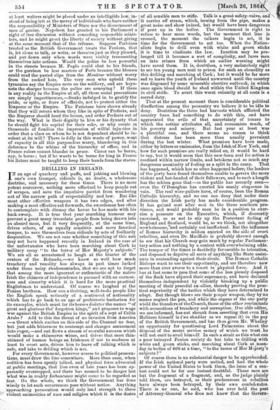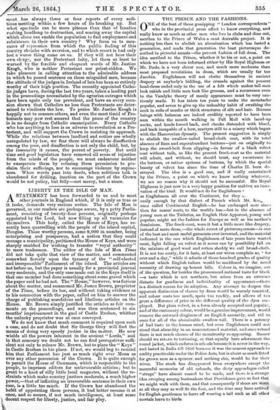DRILLING IN IRELAND.
TN an. age of quackery and puffs, and jobbing and blowing one's own trumpet, ridicule is, no doubt, a wholesome doctrine, and necessary for these times. There is no more potent scarecrow, nothing more effectual to keep people out of scrapes, and save the impulsive patriot from wandering out of the narrow path of respectability and law. But like most other effective weapons it has two edges, and after making a most effective cat forwards, the swordsman has often to contemplate with dismay the havoc he has made with his back-sweep. It is true that your searching humour may prevent a great many irresolute people from being drawn into an absurd mess, but it very frequently, at the same time, drives others, of an equally sensitive and more fanatical temper, to save themselves from ridicule by acts of foolhardy desperation. We are not sure whether something of this sort may not have happened recently in Ireland in the case of the unfortunates who have been marching about Cork in military array "to the terror of Her Majesty's subjects." We are all so accustomed to laugh at the bluster of the orators of the Rotunda,—we know so well how much treachery and venality has always in past times lurked under those noisy rhodomontades, that we are apt to forget that among the more ignorant or enthusiastic of the native Irish the chimera of independence is pursued with an earnest- ness and sincerity which it is hard for the more practical Englishman to understand. Of course we laughed at the Fenian brethren. How can a thriving, well-to-do people like the English speak seriously of a sentiment of nationality which has to go back to an age of prehistoric barbarism for its examples, which must for its heroes disinter the names "of great and glorious tho' forgotten kings," and proposes to wage war against the British Empire in the spirit of a sept of Celtic Arabs ? Add to this the threat of an invasion from America —a threat which excites on this side of the Channel no fear, but just adds bitterness to contempt and changes amusement into enger,--and out flows a stream of scornful sarcasm which would make a rhinoceros wince, and drives that most thin- skinned of human beings an Irishman if not to madness at least to overt acts, drives him to leave off talking which is safe, and take to drilling which is not.
For every Government, however averse to political prosecu- tions, must draw the line somewhere. More than once, when sedition has been openly talked, and physical force advocated at public meetings, that line even of late years has been ap- parently overstepped, and there has seemed to be danger lest what was in reality forbearance might come to be regarded as fear. Oa the whole, we think the Government has done wisely to let such occurrences pass without notice. Anything approaching persecution would only lend strength to those violent animosities of race and religion which it is the desire of all sensible men to stifle. Talk is a great safety-valve, and \ it carries off steam, which, issuing from the pipe, makes a great noise and show indeed, but would have been dangerous if pent up in the boiler. The Government is right to refuse to hear mere words, but the moment that line ia crossed, the moment the talkers begin to act, it is time for the Government to act too. When the Nation- alists begin to drill even with white and green sticks it is time to vindicate the law. Inaction may be pro- longed till it becomes a sort of complicity, and lures men.
on into crimes from which an earlier warning might have saved them. It is doubtless, a very melancholy sight to see ten young men sent to prison for such an absurdity as this drilling and marching at Cork.; but it would be far more sad to leave the youth of Ireland unwarned until the country was disgraced by some miserable abortive outbreak, in which once again blood should be shed within the United Kingdom in civil strife. To avert this worst calamity at all costs is a sacred duty. That at the present moment there is considerable political disaffection among the peasantry we believe it to be idle to deny. Doubtless the three bad harvests which afflicted the country have had something to do with this, and have aggravated the evils of that uncertainty of tenure to which the cottier attributes all, and economists much, of his poverty and misery. But last year• at least was a plentiful one, and there seems no reason to think that distress has been more than usually prevalent during the last winter. What promises have been made, either by letters or emissaries, from the Irish of New York, and how far such promises arc really relied on, it would be hard to say, but it would seem that this new-born zeal for action is confined within narrow limits, and betokens not so much any dangerous unanimity of feeling as a split in the camp. That has happened, which has so often happened before; the leaders of the party have found themselves unable to govern the more violent and hot-headed of their followers, and to such a length has the schism gone that—as the public has recently seen— even the O'Donoghtte has exerted his manly eloquence in vain. The real wire-pullers have, of course, been the Roman Catholic hierarchy, and no one can deny that under their direction the Irish party has made considerable progress. It has gained seat after seat in the three southern pro,- vinces, and would probably soon be in a position to exer- cise a pressure on the Executive, which, if discreetly exercised, so as not to stir up the Protestant feeling of England and Scotland, would be, as we think, not altogether unwholesome,*and certainly not ineffectual. But the influence of Roman hierarchy is seldom exerted on the side of overt rebellion, and even Dr. MacHale is probably shrewd enough to see that his Church may gain much by regular Parliamen- tary action and nothing by a contest with overwhelming odds. The temper of the times is decidedly favourable to toleration, and disposed to deprive all sects of anything like State assist- ance in contending against their rivals. The Roman Catholic Bishops want to use their opportunity, and are therefore now more than ever averse to a resort to physical force. And it has at last come to pass that some of the less piously disposed of the flock have abjured their supremacy, and have declared themselves independent by violently breaking up a public meeting of their peaceful ex-allies, thereby proving the prac- tical superiority of the tactics which they have determined to adopt. But though blows are their proper weapon, they by no means neglect the pen, and while the organs of the one party wield the thunders of the Church, those of the other reeriminate with accusations of treachery and corruption. One able editor, we are informed, has not shrunk from asserting that even His Holiness himself is (we shudder as we repeat it) in the pay of the British Government, and has thus given Mr. Whalley an opportunity for questioning Lord Palmerston about the disposal of the secret service money of which we trust he will not omit to avail himself. In such a strait as this what can a poor betrayed Fenian society do but take to drilling with white and green sticks, and marching about Cork at noon- day in bodies of 600 at a time, "to the terror of Her Majesty's subjects ?"
Of course there is no substantial danger to be apprehended. If the Irish national party were united, and had the whole power of the United States to back them, the issue of a con- test could not be for one instant doubtful. These men are but the fragment of a fragment, and, as the judge plainly told them, are betrayed, as their predecessors in rebellion have always been betrayed, by their own confederates. There is no one, he said, who has ever held the post of Attorney-General who does not know that the Govepte. ment has always three or four reports of every sedi- tious meeting within a few hours of its breaking up. But what spectacle can be more piteous than that of fanatics rushing headlong to destruction, and scaring away the capital which alone can enable the population to find employment and subsistence in their own country ? Why force us to mea- sures of repression from which the public feeling of this Country shrinks with aversion, and to which resort is had only lest a worse thing come on us. If they will not hear their own els rgy, nor the Protestant laity, let them at least be warned by the forcible and eloquent words of Mr. Justice Keogh, who is neither Protestant nor priest-ridden. We take pleasure in calling attention to the admirable address in which he passed sentence on these misguided men, because the attitude of the judges in Ireland of late has been so entirely worthy of their high position. The recently appointed Catho- lic judges have, during the last two years, taken a leading part in the proceedings necessitated by the agrarian outrages which have been again only too prevalent, and have on every occa- sion shown that Catholics no less than Protestants are deter- mined to vindicate the law. To praise Mr. Justice Keogh is happily not to censure others, and even the most timid of Pro- testants may ,pow rest assured that the peace of the country is in no danger from Catholic emancipation. Every Catholic who has anything to lose is as adverse to revolution as a Pro- testant, and will support the Crown in resisting its approach. While the relations between landlord and cottier are wholly unregulated by law, we fear there will always be disaffection among the poor, and disaffection is not only the child, but, by the insecurity it causes, the parent of poverty. But until time and good legislation have removed all sense of injustice from the minds of the people, we must endeavour neither to exasperate them by refusing them permission to pro- claim their sufferings, nor to encourage violence by supine- ness. When words pass into deeds, when seditious talk is abandoned for drilling, inaction on the part of the Crown would be not policy, but folly—not mercy, but a snare.































 Previous page
Previous page